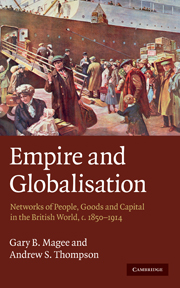Book contents
2 - Networks and the British World
Published online by Cambridge University Press: 05 June 2012
Summary
Introduction
The idea that social connections matter, and can be thought of in networked terms, should startle few scholars. Dubbed a ‘metaphor for our times’, networks are currently given a prominent role in historical and contemporary social analysis, as well as in debates about globalisation. Yet the term ‘network’ tends to be employed rather casually. The technological and social aspects of networks are not always sufficiently differentiated, while networks seemingly encompass an ever-wider range of human activities and forms of interaction. At worst, the network concept serves as little more than a shorthand for human behaviour deemed too collective to be determined by pure individual choice, yet too diffuse and personal to be taken up by formal state or market institutions. There is clearly a danger here. If networks can be taken to mean almost any kind of informal set of interpersonal connections, the term is likely to be too imprecise to have much purchase. As one commentator warns, ‘if everything is a network then nothing is’.
Hence great care is required in assessing the importance of networks as agents of historical change. In the following chapters we explore how a variety of social networks created links between individuals and groups, and how these links in turn facilitated the movement of commodities, money, information and people across national or, more accurately, colonial borders. That said, it must be emphasised at the outset that causative relationships between two phenomena cannot be inferred from spatial and temporal co-existence alone.
- Type
- Chapter
- Information
- Empire and GlobalisationNetworks of People, Goods and Capital in the British World, c.1850–1914, pp. 45 - 63Publisher: Cambridge University PressPrint publication year: 2010

